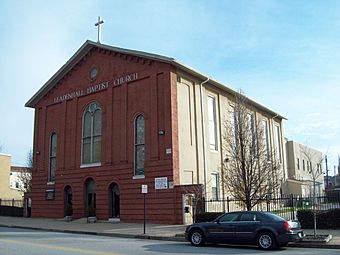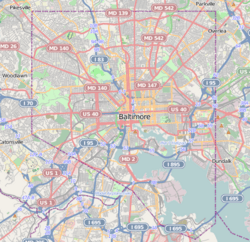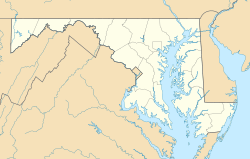Leadenhall Street Baptist Church facts for kids
Quick facts for kids |
|
|
Leadenhall Street Baptist Church
|
|

Leadenhall Street Baptist Church,
December 2011 |
|
| Location | 1021-1023 Leadenhall Street, Baltimore, Maryland |
|---|---|
| Area | 0.2 acres (0.081 ha) |
| Built | 1873 |
| Architect | Thomas, Joseph, & Son |
| Architectural style | Romanesque Revival architecture |
| NRHP reference No. | 79003218 |
| Added to NRHP | March 16, 1979 |
Leadenhall Street Baptist Church is a historic Baptist church located in Baltimore, Maryland, United States. It is a rectangular brick building with a front shaped like a triangle. The outside walls were originally brick but are now covered with a material called formstone on the front and stucco on other sides. The church has beautiful round-arched stained glass windows.
The church was built in 1873 by Joseph Thomas & Son. It was built for the city's African American Baptists. These church members lived in the "Sharp-Leadenhall" community. This area is in the old "South Baltimore" part of the city. It is close to the famous "Inner Harbor" area.
Contents
A Look at the Neighborhood
The "Sharp-Leadenhall" neighborhood is just west of the Federal Hill area. Federal Hill is a historic spot. In 1788, people had a big celebration there. They were celebrating Maryland agreeing to the new U.S. Constitution.
Federal Hill During the Civil War
Later, during the Civil War, Northern troops built defenses on Federal Hill. They put large cannons there. This helped them watch over and control the city. Baltimore had many citizens who supported the Southern states. In April 1861, there was a difficult time in Baltimore. Some citizens attacked Northern troops passing through. These troops were on their way to Washington, D.C.. They were going to defend the capital from the Southern states that had left the Union.
Sharp-Leadenhall: A Special Community
The "Sharp-Leadenhall" neighborhood became one of the first areas in Baltimore where most residents were African Americans. Baltimore had a large population of free African Americans in the 1800s. Before this time, many free African Americans lived among white residents. They often lived on smaller streets and alleys. They worked in homes and businesses of the white population. Later, more free African Americans began moving to other areas. One of these areas was the northwest part of the city, known as Upton.
The Church's Important History
The Leadenhall Street Baptist Church was built and paid for by the Maryland Baptist Union Association. This group was made up mostly of African American Baptists. They had generally separated from white Baptists. In earlier times, during the late 1700s and early 1800s, African American and white Baptists often worshipped together. However, African Americans usually sat in separate areas.
A Landmark for African Americans
Leadenhall Street Baptist Church is the second oldest Black church building in Baltimore. It is also home to one of the city's largest African American church groups. Another important church in the area was the nearby Sharp Street Methodist Church. This church also played a big role in Baltimore's growing African American community.
National Recognition
Leadenhall Street Baptist Church was added to the National Register of Historic Places in 1979. This list helps protect important historical sites. It is managed by the National Park Service. This service is part of the United States Department of the Interior.
Baltimore's Heritage Area
Much of downtown Baltimore and its historic neighborhoods are now part of the Baltimore City National Heritage Area. This area helps people learn about the city's past. There are new signs on the streets with pictures, maps, and information. These signs tell about historic sites and buildings. They also show tours of the heritage areas.
The heritage area highlights the African American history in Baltimore. It points out places like the Leadenhall Church. It also shows many other Black churches and important places. It also notes the homes and locations of important people in African American history.




